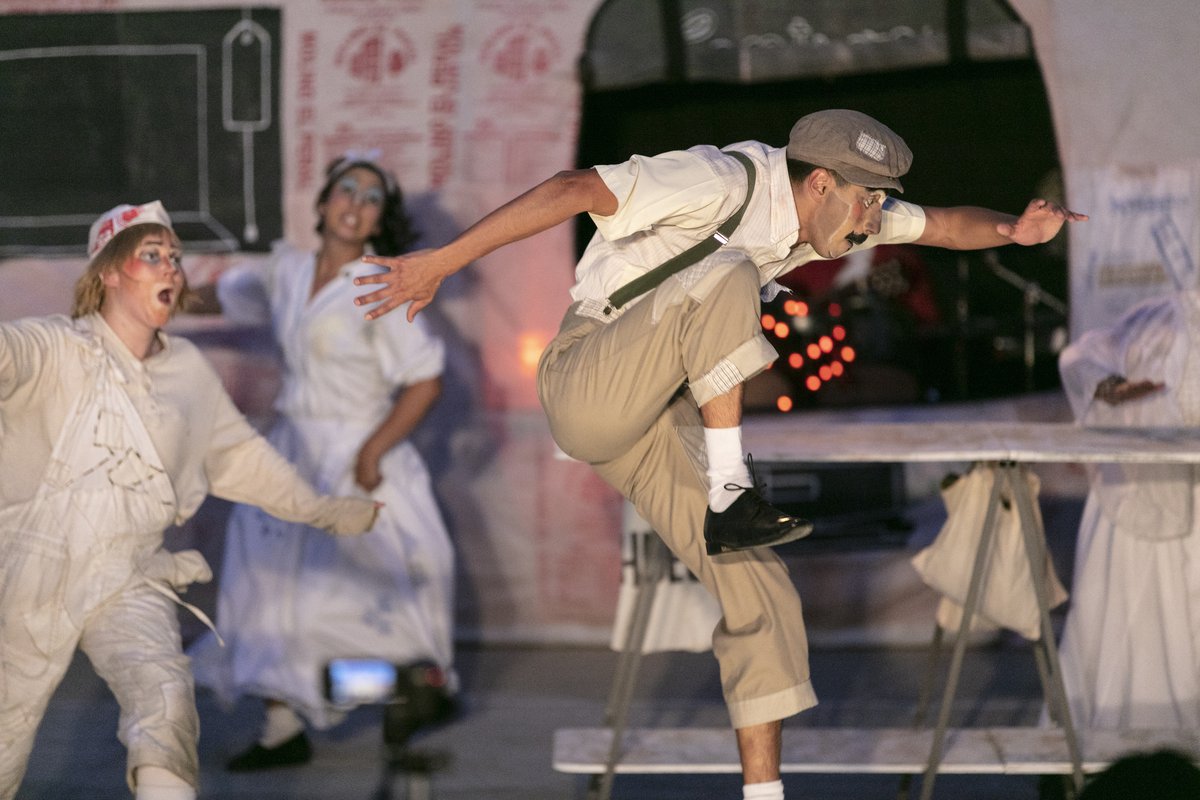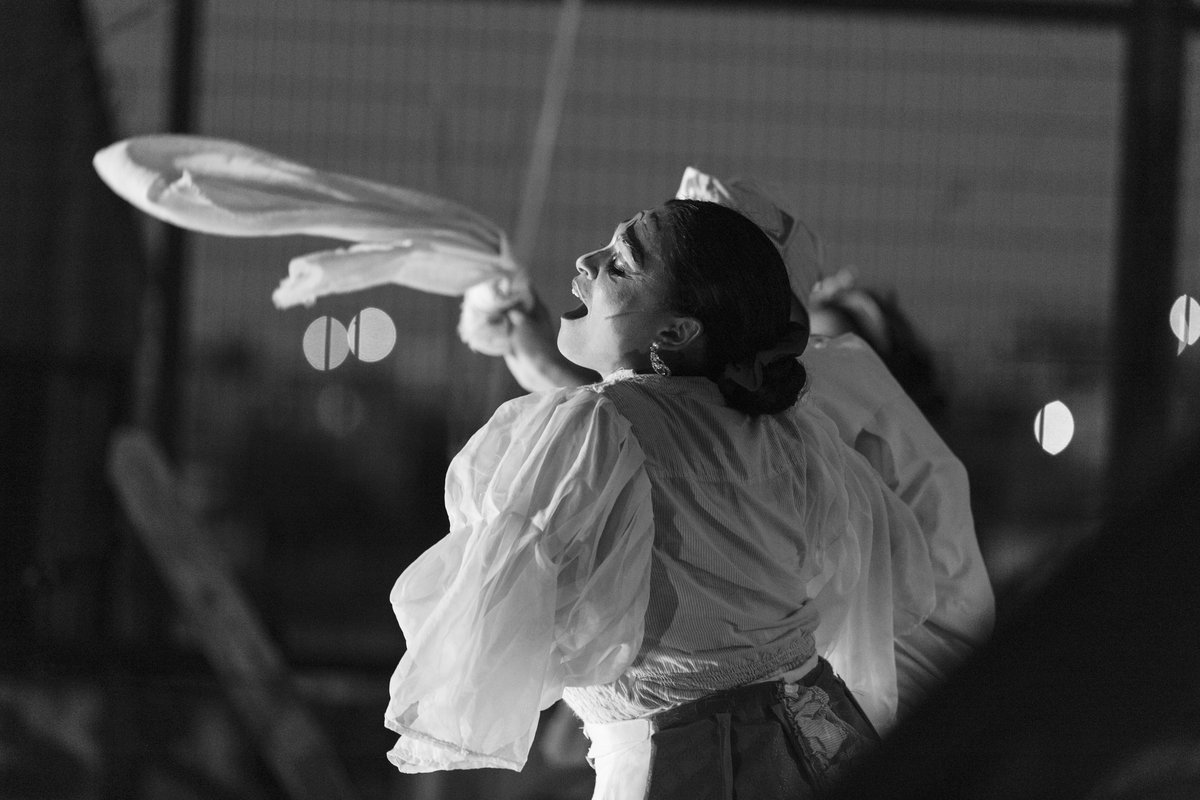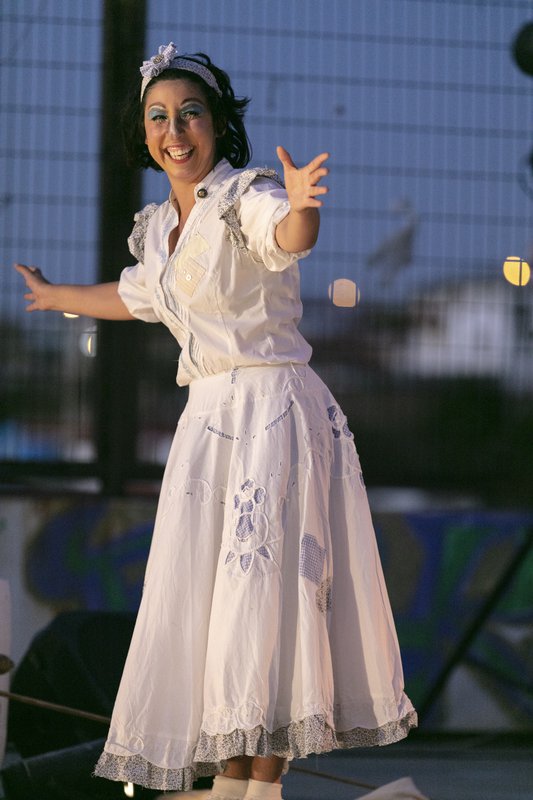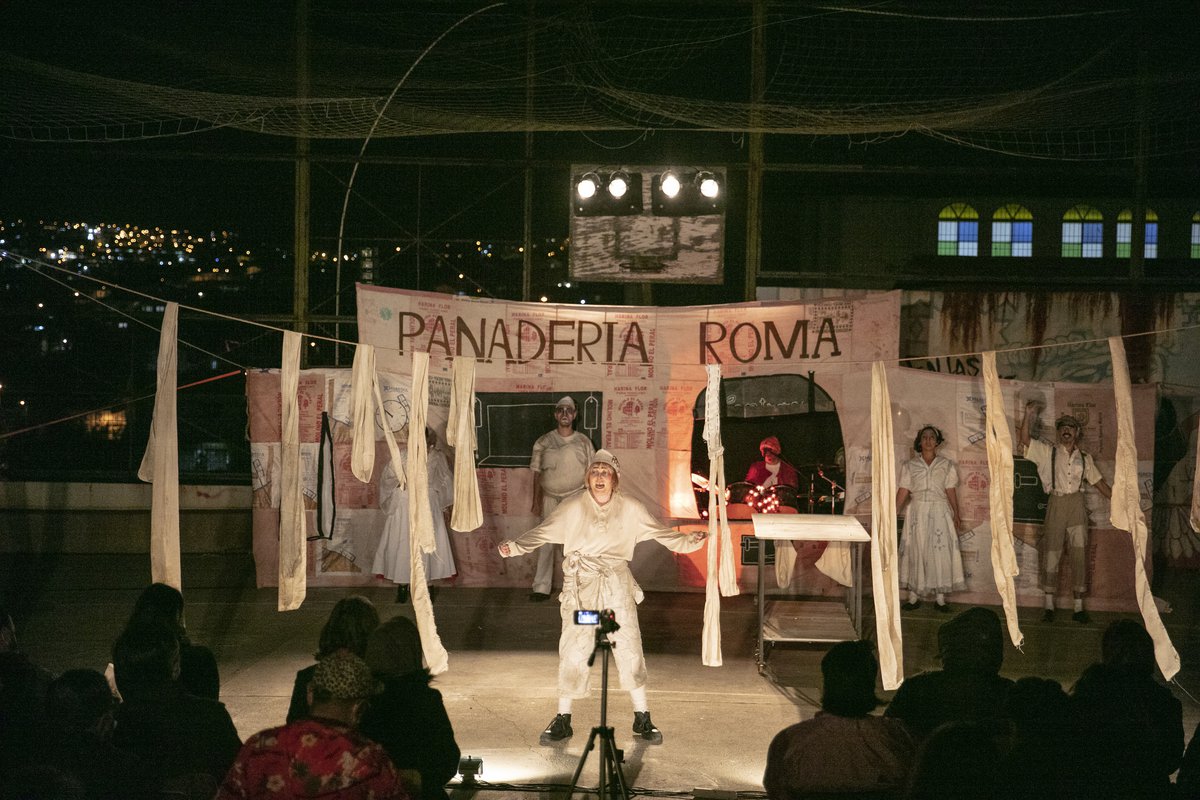Street Theater
January 22nd, Casablanca
"The play manages to introduce the spectator into the marrow of what forges Valparaíso’s identity until today."
Dramaturgue: Juvenal Pizarro Alfaro | Director: Sebastián Caro Caro | Actresses: Constanza Segovia Chamorro, Ruby Frías Tobar, María José Farfal | Actors: Víctor Álvarez de la Barra, Elías Flores Saavedra | Sound Universe: Moisés Maturana | Tangos/Breads: Juvenal Pizarro Alfaro | Lighting: Andrés Pérez Rojas (Estudio Astrom) | Sound: Juan Pablo Echeverría
Sebastián Caro Caro
Director
A focus on Commedia dell’ Arte
Sebastián is an actor, graduated in Performing Arts from Universidad de Playa Ancha and holds a diploma in Theater Pedagogy from the Universidad Católica de Chile. He is also specialized in Commedia dell’Arte at the Scuola Internazionale dell'Attore Comico, Italy. His theatrical work has been marked by management, teaching, acting and directing. He has participated in more than five theatrical productions with the company Gran Circo Teatro, La Negra Ester being one of them. He currently teaches theater at the Estudio de Artes, EA, in Valparaíso.
Juvenal Pizarro Alfaro
Dramaturge
Soul, Theater and Bread
Juvenal is a dramaturge, poet, baker and social leader. He has focused on strengthening neighborhoods to rebuild social networks. He was the vice-president of the Rodelillo Community Center, participating in the Cultura Comunitaria Viva program. He also wrote Patria Nueva, for Teatro del Ocaso, and En la puerta del horno se quema el pan, for the Cooperativa Teatral de Valparaíso.
Cooperativa Teatral Valparaíso
The company
Collaborative work in the port
The ensemble was founded in 2018 under the basic principles of cooperativism applied to theater, in order to generate better working conditions for emerging performing artists in the region of Valparaíso. It is composed mainly by performers who hold a theatre degree from the Universidad de Playa Ancha, and work on three lines of action: exhibition, digital catalog and education. They develop their performances in Espacio Cultural Esmeralda, where they promote collaborative art with other groups from different areas.
-Because it rescues a tradition that has forged the popular culture of the port of Valparaíso, the baking industry, through a text written precisely by a master baker. Thus, while the play takes place, the playwright/baker prepares bread to share with the audience at the end of the presentation, thus sharing the importance of this food in the Chilean table, but above all, as a product of universal access in difficult times.
-Because it paints an interesting retrospective image of a migrant and convulsed Valparaíso, not very different from today. Through comedy, the play leads to reflect on the current situation of the port and other issues such as poverty, child labor and the need to ensure decent rights for workers.
Commedia dell’ Arte: A theatrical style that emerged in the 16th century in Italy, during the Renaissance, and became very popular in Europe for its humor, on-stage improvisation, and its festive and carnival-like stories, performed mainly in public spaces such as squares and markets. It was a very popular genre until the 19th century.
On Instagram, @cooperativateatralvalparaiso
On Facebook, Cooperativa Teatral Valparaíso
COLABORA

En la puerta del horno se quema el pan
By Cooperativa Teatral de Valparaíso | Written by Juvenal Pizarro Alfaro | Directed by Sebastián Caro Caro
- Chile
- Spanish
- 70 minutes
- + 10 años
The story a boy who works as a baker, Rucio Pizarro, marks the beginning of a journey into the tumultuous Valparaíso of the 1930s.
En la puerta del horno se quema el pan tells the story of Rucio Pizarro, a boy who works in the Roma bakery located at the Barón hill of Valparaiso during the 30's. There he lives his passage from childhood to adolescence, in the midst of the blossoming of traditional Chilean bakery, and an agitated political context that demands better wages for workers. Between tangos, cuecas and confrontations, Rucio has to make decisions that shall change his destiny and lead him to leave his childhood behind.
Written in rhymes, with live music and an aesthetic close to the Commedia dell’ Arte, the play seeks to portray the world of Valparaíso’s bakeries in the early twentieth century: a booming industry in the hands of Italian and Spanish immigrants who settled in the port, along with Mapuche and peasant population who flew from the countryside to the town, while unions began to gain strength in order to achieve better working conditions.
"The play manages to introduce the spectator into the marrow of what forges Valparaíso’s identity until today."
En la puerta del horno se quema el pan
By Cooperativa Teatral de Valparaíso | Written by Juvenal Pizarro Alfaro | Directed by Sebastián Caro Caro
- Chile
- Spanish
- 70 minutes
- + 10 años
The story a boy who works as a baker, Rucio Pizarro, marks the beginning of a journey into the tumultuous Valparaíso of the 1930s.
En la puerta del horno se quema el pan tells the story of Rucio Pizarro, a boy who works in the Roma bakery located at the Barón hill of Valparaiso during the 30's. There he lives his passage from childhood to adolescence, in the midst of the blossoming of traditional Chilean bakery, and an agitated political context that demands better wages for workers. Between tangos, cuecas and confrontations, Rucio has to make decisions that shall change his destiny and lead him to leave his childhood behind.
Written in rhymes, with live music and an aesthetic close to the Commedia dell’ Arte, the play seeks to portray the world of Valparaíso’s bakeries in the early twentieth century: a booming industry in the hands of Italian and Spanish immigrants who settled in the port, along with Mapuche and peasant population who flew from the countryside to the town, while unions began to gain strength in order to achieve better working conditions.
"The play manages to introduce the spectator into the marrow of what forges Valparaíso’s identity until today."
Dramaturgue: Juvenal Pizarro Alfaro | Director: Sebastián Caro Caro | Actresses: Constanza Segovia Chamorro, Ruby Frías Tobar, María José Farfal | Actors: Víctor Álvarez de la Barra, Elías Flores Saavedra | Sound Universe: Moisés Maturana | Tangos/Breads: Juvenal Pizarro Alfaro | Lighting: Andrés Pérez Rojas (Estudio Astrom) | Sound: Juan Pablo Echeverría
Sebastián Caro Caro
Director
A focus on Commedia dell’ Arte
Sebastián is an actor, graduated in Performing Arts from Universidad de Playa Ancha and holds a diploma in Theater Pedagogy from the Universidad Católica de Chile. He is also specialized in Commedia dell’Arte at the Scuola Internazionale dell'Attore Comico, Italy. His theatrical work has been marked by management, teaching, acting and directing. He has participated in more than five theatrical productions with the company Gran Circo Teatro, La Negra Ester being one of them. He currently teaches theater at the Estudio de Artes, EA, in Valparaíso.
Juvenal Pizarro Alfaro
Dramaturge
Soul, Theater and Bread
Juvenal is a dramaturge, poet, baker and social leader. He has focused on strengthening neighborhoods to rebuild social networks. He was the vice-president of the Rodelillo Community Center, participating in the Cultura Comunitaria Viva program. He also wrote Patria Nueva, for Teatro del Ocaso, and En la puerta del horno se quema el pan, for the Cooperativa Teatral de Valparaíso.
Cooperativa Teatral Valparaíso
The company
Collaborative work in the port
The ensemble was founded in 2018 under the basic principles of cooperativism applied to theater, in order to generate better working conditions for emerging performing artists in the region of Valparaíso. It is composed mainly by performers who hold a theatre degree from the Universidad de Playa Ancha, and work on three lines of action: exhibition, digital catalog and education. They develop their performances in Espacio Cultural Esmeralda, where they promote collaborative art with other groups from different areas.
-Because it rescues a tradition that has forged the popular culture of the port of Valparaíso, the baking industry, through a text written precisely by a master baker. Thus, while the play takes place, the playwright/baker prepares bread to share with the audience at the end of the presentation, thus sharing the importance of this food in the Chilean table, but above all, as a product of universal access in difficult times.
-Because it paints an interesting retrospective image of a migrant and convulsed Valparaíso, not very different from today. Through comedy, the play leads to reflect on the current situation of the port and other issues such as poverty, child labor and the need to ensure decent rights for workers.
Commedia dell’ Arte: A theatrical style that emerged in the 16th century in Italy, during the Renaissance, and became very popular in Europe for its humor, on-stage improvisation, and its festive and carnival-like stories, performed mainly in public spaces such as squares and markets. It was a very popular genre until the 19th century.
On Instagram, @cooperativateatralvalparaiso
On Facebook, Cooperativa Teatral Valparaíso
COLABORA






